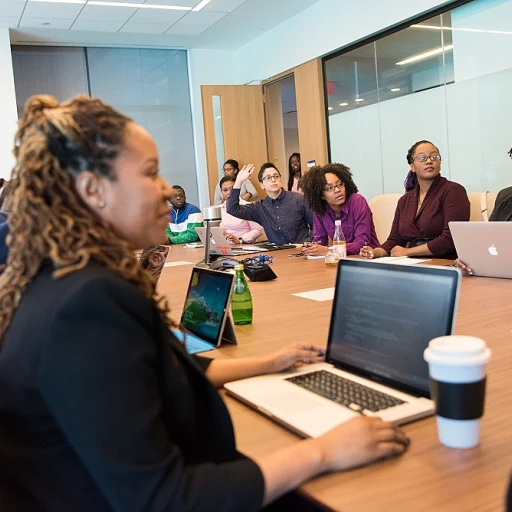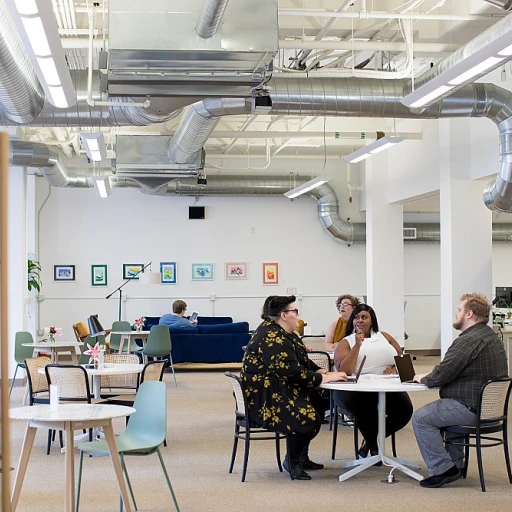
Understanding the link between staff meetings and soft skills
Why Meetings Matter for Soft Skills Growth
Staff meetings are often seen as routine, but they play a crucial role in shaping the soft skills that employees need for a balanced work life. When teams gather, it’s not just about sharing updates or assigning tasks. These moments are opportunities for learning, training, and real-time skills development that go beyond technical know-how.
In today’s workplace, soft skills like effective communication, problem solving, and emotional intelligence are just as important as hard skills. Staff meetings create a natural environment for employees to practice these abilities. For example, when team members share feedback or discuss challenges, they’re building interpersonal skills and learning how to communicate effectively with others.
- Active listening is practiced when team members pay attention to each other’s ideas.
- Decision making and leadership skills are developed as employees contribute to discussions and help guide the team.
- Time management is reinforced when meetings are structured and focused, helping everyone respect each other’s schedules.
Regular meetings also encourage open minded thinking and team building. Employees learn to adapt to different perspectives, which is essential for effective teamwork and a healthy work-life balance. In fact, organizations that prioritize skills training during meetings often see improvements in employee satisfaction and business outcomes.
For those interested in how workplace surveys can further support work-life balance and skill development, check out this resource on how a school experience survey can shape your work-life balance. It offers insights into how feedback and reflection can enhance both individual and team growth.
Common challenges in balancing work life during meetings
Why Meetings Can Disrupt Work-Life Balance
Staff meetings are essential for team communication and skills development, but they often present real challenges for employees trying to maintain a healthy work-life balance. When meetings are frequent, poorly timed, or lack clear objectives, they can disrupt workflow and personal time. This can lead to stress, reduced productivity, and even burnout, especially when employees feel their ability to manage time is compromised.
Common Obstacles Faced by Employees
- Time management difficulties: Meetings that run over schedule or are set outside regular work hours can interfere with personal commitments and reduce time for focused work.
- Lack of effective communication: When objectives are unclear or feedback is not constructive, meetings can feel unproductive, making it harder for team members to see their value.
- Overlapping responsibilities: Employees often juggle multiple tasks. Meetings that do not respect boundaries can make it difficult to balance work and personal life, especially in roles that require strong problem solving and decision making skills.
- Emotional fatigue: Continuous meetings without breaks can drain emotional intelligence and interpersonal skills, impacting overall well-being and the ability to participate effectively in the workplace.
Impact on Skills Development and Team Dynamics
While meetings are meant to foster skills training and team building, these challenges can hinder the development of both hard skills and soft skills. Employees may struggle to engage in active listening or open minded discussion if they feel overwhelmed. This can affect the team's ability to collaborate, provide effective feedback, and build leadership skills.
To address these issues, organizations need to implement strategies that support both skills development and work-life balance. For insights on creating a balanced workplace through effective people management, see key principles for a balanced workplace.
Practical ways to use meetings for soft skill development
Turning Meetings into Learning Opportunities
Staff meetings are often seen as routine, but they can be powerful moments for developing soft skills in the workplace. When approached with intention, these gatherings help employees practice effective communication, active listening, and problem solving in real time. By shifting the focus from just updates to skill-building, teams can transform meetings into ongoing training programs that support both business goals and work-life balance.
- Encourage open-minded discussions: Create space for team members to share ideas and feedback. This not only builds confidence but also strengthens interpersonal skills and emotional intelligence.
- Practice active listening: Make it a habit for everyone to listen fully before responding. This helps develop empathy and improves communication teamwork, which is essential for effective collaboration.
- Assign rotating roles: Let different employees lead meetings or facilitate discussions. This approach supports leadership development and gives everyone a chance to practice decision making and time management.
- Integrate real-time feedback: Offer constructive feedback during or after meetings. This helps team members identify areas for improvement and reinforces a culture of continuous learning.
- Focus on problem solving: Use meetings to tackle real workplace challenges together. This not only sharpens hard skills but also encourages teamwork and creative thinking.
For organizations looking to maximize the impact of meetings, leveraging the best AI feedback platforms to enhance company training can provide valuable insights and support ongoing skills training. These tools help track progress, identify skill gaps, and ensure that meetings remain effective and engaging for all team members.
By making meetings a regular part of your skills training strategy, you help employees develop the soft skills needed to thrive in today’s business environment. This approach not only benefits the team but also supports a healthier work-life balance by making every meeting a step toward personal and professional growth.
Encouraging participation and empathy in team discussions
Fostering Open-Minded Dialogue and Active Listening
Encouraging participation in staff meetings is essential for building a team culture that values soft skills and supports work-life balance. When employees feel comfortable sharing ideas and concerns, they are more likely to develop interpersonal skills and emotional intelligence. Open-minded dialogue allows team members to practice active listening, which is a cornerstone of effective communication and problem solving in the workplace.- Active listening: When team members listen attentively, they show respect for others’ perspectives and help create a supportive environment. This ability is crucial for both leadership and team building.
- Open-mindedness: Encouraging employees to consider different viewpoints helps develop decision making skills and fosters a culture of learning and growth.
- Constructive feedback: Providing and receiving feedback during meetings helps employees improve their communication teamwork and interpersonal skills, which are vital for effective management and business success.
Creating a Safe Space for Empathy and Growth
A safe and inclusive meeting environment empowers employees to express themselves without fear of judgment. This not only helps with skills training but also supports emotional intelligence and empathy among team members. When empathy is present, employees are more likely to support each other’s work-life balance needs, leading to a healthier workplace.- Empathy in action: Recognizing and validating colleagues’ experiences helps build trust and strengthens team relationships.
- Encouraging participation: Leaders can invite quieter team members to share their thoughts, ensuring everyone has a voice and the opportunity to develop soft skills.
- Learning from feedback: Honest discussions about challenges and successes help employees grow and adapt, improving both hard skills and soft skills over time.
Practical Tips for Effective Participation
- Set clear expectations for participation and respectful communication.
- Use structured activities, such as round-robin sharing or small group discussions, to involve all team members.
- Offer skills training sessions focused on communication, time management, and leadership as part of regular meetings.
- Encourage reflection on how meeting dynamics impact work-life balance and personal development.
Setting boundaries to protect work life balance during meetings
Protecting Personal Time Without Sacrificing Team Growth
Balancing work and personal life during staff meetings can be challenging, especially when meetings run long or lack clear focus. However, setting boundaries is essential for maintaining well-being and ensuring that meetings remain a tool for skills development, not a source of stress.- Define clear meeting objectives: When employees know the purpose of a meeting, they can prepare more effectively and participate with intention. This helps keep discussions on track and supports the development of soft skills like effective communication and decision making.
- Respect scheduled times: Start and end meetings as planned. Time management is a critical skill in the workplace, and respecting the agenda shows consideration for everyone’s work-life balance. It also models good leadership and management practices for team members.
- Encourage concise communication: Focusing on clear, direct exchanges helps teams practice active listening and communication teamwork. It also prevents meetings from encroaching on personal time, supporting employees’ ability to recharge and maintain productivity.
- Set expectations for participation: Not every team member needs to be present for every discussion. Allowing flexibility in attendance, when possible, helps employees manage their workload and personal commitments more effectively.
- Use feedback to improve: Regularly ask for feedback on meeting structure and timing. This demonstrates open minded leadership and helps identify ways to make meetings more effective for skills training and team building, while respecting individual boundaries.
Real-life examples of teams benefiting from skill-focused meetings
Stories of Growth Through Skill-Focused Meetings
Many organizations have discovered that regular staff meetings, when designed with intention, can be powerful platforms for developing soft skills and improving work-life balance. Here are a few real-life examples that highlight how teams have benefited from this approach:
- Boosting Communication and Teamwork: In a mid-sized business, managers noticed that employees struggled with effective communication and teamwork. By dedicating part of each meeting to active listening exercises and open-minded discussions, the team gradually improved their ability to share feedback and collaborate. This not only enhanced their interpersonal skills but also reduced misunderstandings, making the workplace more supportive and less stressful.
- Improving Time Management and Decision Making: A technology company implemented a new meeting structure focused on time management and decision making. Employees were encouraged to set clear agendas and stick to allotted times. Over several months, the team developed stronger time management skills, which translated into more efficient meetings and better work-life balance. The ability to make decisions quickly and effectively also improved, reducing overtime and helping employees maintain boundaries between work and personal life.
- Developing Emotional Intelligence and Leadership: In a healthcare setting, regular team meetings included short training programs on emotional intelligence and leadership. Team members practiced empathy by sharing workplace challenges and supporting each other. This helped employees develop leadership skills and emotional intelligence, which are crucial for managing stress and fostering a positive work environment.
- Encouraging Problem Solving and Feedback: A retail team used meetings as a space for collaborative problem solving. Employees were invited to bring up real workplace issues, and the group worked together to find solutions. This approach not only improved problem solving skills but also created a culture of open feedback and continuous learning, making the team more resilient and adaptable.
These examples show that with the right focus, staff meetings can become more than just routine check-ins. They can be effective tools for skills training, team building, and personal development. By integrating soft skill development into regular meetings, organizations help employees grow their abilities while supporting a healthier balance between work and life.













